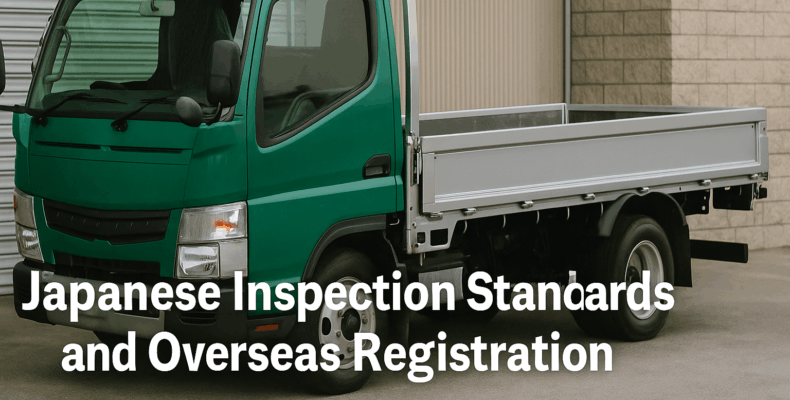Japanese Inspection Standards and Overseas Registration
When you buy a used truck from Japan, you’re not just getting a vehicle—you’re receiving one that has been inspected under some of the strictest safety and environmental standards in the world. However, understanding these Japanese inspection standards and how they align with registration requirements in your country is crucial before you import.
In this article, we’ll explain Japan’s vehicle inspection system, how it impacts overseas buyers, and what steps to follow to register your truck abroad without delays or surprises.
To simplify your buying process, here’s a reliable resource:
👉 Top 5 Trusted Japanese Used Truck Exporters for Global Buyers
What Is the Japanese Vehicle Inspection System (Shaken)?
In Japan, every vehicle must undergo a mandatory inspection known as “Shaken” every 2–3 years depending on the age and type of the vehicle.
Shaken includes:
-
Brake performance check
-
Exhaust emissions measurement
-
Lighting and indicator function
-
Frame integrity and rust check
-
Odometer and instrument panel inspection
This process ensures that only safe, clean, and well-maintained vehicles stay on the road. As a result, most trucks available for export are in excellent condition.
What Documents Come with an Inspected Japanese Truck?
When you buy from a professional exporter, your truck should include:
-
Export Certificate
-
Shaken Inspection Record
-
Odometer Certification (if applicable)
-
De-registration Certificate
-
Inspection Report (for JEVIC, QISJ, or JAAI where required)
These documents are vital when registering the truck in your home country.
Country-Specific Registration Requirements
Let’s explore how different countries handle registration for Japanese used trucks:
🇰🇪 Kenya, Tanzania, Uganda
Pre-export inspection is mandatory. JEVIC or QISJ is required for roadworthiness.
Trucks older than 8 years may not qualify.
🇳🇿 New Zealand
Strict biosecurity and emission standards. Undercarriage must be free of soil.
Odometer verification is essential.
🇦🇺 Australia
Vehicles must pass quarantine and structural safety inspection.
Japanese trucks with good Shaken history have a higher chance of approval.
🇬🇧 UK
An Individual Vehicle Approval (IVA) may be needed.
Japanese compliance helps but additional steps are required locally.
🇹🇿 Tanzania
Pre-shipment inspection required.
JAAI or QISJ certifications accepted.
For any country, working with an experienced exporter is key to ensuring your vehicle meets all local requirements.
👉 Top 5 Trusted Japanese Used Truck Exporters for Global Buyers
How Inspections Affect Truck Value and Trust
Trucks that have passed the Shaken test or third-party inspections:
-
Are usually mechanically sound
-
Show verified mileage
-
Often come with documented service history
-
Hold better resale value internationally
Moreover, they reduce the risk of hidden defects that could cost you later.
Inspection Agencies You Should Know
Here are trusted inspection bodies recognized worldwide:
| Agency | Known For | Accepted In |
|---|---|---|
| JEVIC | Odometer + Roadworthiness | Kenya, Uganda, Zambia |
| QISJ | Roadworthiness + Emissions | Tanzania, Jamaica |
| JAAI | Export inspections | South Asia, Africa |
| MAF | Biosecurity (soil & plants) | New Zealand |
Make sure your exporter uses one of these if your country requires it.
Registration Tips for First-Time Importers
To avoid registration delays and costs:
-
Confirm your country’s import rules before you buy
-
Choose a truck within the age limit allowed locally
-
Ask for inspection reports and export certificates
-
Use exporters with international compliance experience
-
Prepare translations if your country does not accept Japanese documents
Starting with the right exporter saves you time and money.
👉 Top 5 Trusted Japanese Used Truck Exporters for Global Buyers
Conclusion: Inspections Protect Buyers and Build Trust
In summary, Japan’s inspection system ensures that exported trucks are clean, safe, and reliable. Understanding these inspection standards—and how they connect to your country’s registration process—is the smartest way to ensure a successful import.
Don’t leave compliance to chance. Partner with experienced exporters who handle everything for you.
👉 Top 5 Trusted Japanese Used Truck Exporters for Global Buyers
